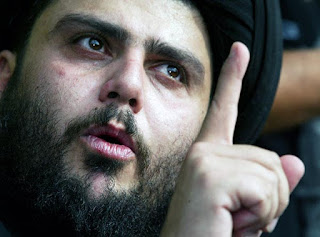Stop Breathing that Air! It's over MY Land!
A few days ago a meeting convened at the Council on Foreign Relations (CFR) and the world received it's 2015-16 report card, and guess what? We got a 'B,' which is actually better than the 'C' grade for last year.
So what's this all about? Well, it's a grade given to the world based on 'international cooperation' and is awarded by the Council of Councils (CoC), a global think tank of experts from leading institutions from 25 different countries. In their own words, the
"The Council of Councils is an international initiative to connect leading foreign policy institutes from around the world in a dialogue on issues of global governance and multilateral cooperation."
The meeting itself was very interesting and informative, but I hear you saying, so what? Why does the world need a report card? And I'd answer, that's a damn good question, and I'll do my best to give you a damn good answer!
Very quickly, these experts and their teams, 'evaluate multi-lateral efforts to address 10 of the world's most pressing challenges,' such as 'advancing global health, countering transnational terrorism' and 'mitigating and adapting to climate change,' and once evaluated each institution gives a grade (ranging A+, A, A- though to F giving a through range of 5 basic grades in total) for each challenge based on what they have witnessed, discovered or assessed to be the situation over the past year. Each challenge is then ranked (i.e. 1-10, with 10 of least importance) based on their take on the priority of importance to the world relative to the other challenges. The idea being that the governments of the world can then make policy decisions/adjustments based on the findings and we (the world) should then reap the benefits from their collective wisdom and policy changes!
For the full report and details of each challenge, how they are graded, etc, etc, etc, visit http://www.cfr.org/councilofcouncils/reportcard/#!/ I recommend it. It's a good read and well worth the time and effort to do so, even if it is a bit droll at times.
 |
| Much of the Middle East may become unlivable by 2050. |
Not surprisingly, given all the shit going on right now, the top 3 challenges are all to do with combating terrorism and dealing with conflict between states (e.g. Ukrainian conflict) and intra-state (e.g. Syrian civil war). No surprise there! A quick glance at the TV news each evening would probably be enough for us to nod our heads in agreement at those particular assessments. Number 4 on the list of worldwide priorities is the global economy and number 5 is 'mitigating and adapting to climate change,' and it's this challenge I'm going to look at in this blog today.
In last years report the 'climate' was given a 'C' grade so has in effect jumped two grades this year with 'A' mainly because of the 'COP21' Paris Agreement earlier this year and the UN Framework Convention on Climate Change (UNFCCC) at the end of last year, both of which are deemed (by the Council) to be feather's in the cap of the fight against climate change! Furthermore, this 'challenge' also took the number 1 ranking in the 'hope for (further) progress' in the next year!
Now, I'm not an expert in climate change (despite a degree in Zoology and post-grad studies in ecology - see photo of macaques below), so far be it for me to disagree with the Council, but it would seem to me that they have vastly underestimated the relative importance of climate change to the world. Whilst I can fully understand the need to put the fights against terrorism and combating conflicts, even the world economy, ahead of climate change - after all they fill our newspapers and TV screens on a daily basis, maybe even keep us awake at night worrying about ever increasing bills, bomb threats, the safety of our kith and kin, the rate of inflation or how the mortgage will be paid - I still think the Council has got it wrong.
I would argue that terrorism and global conflicts were placed ahead of climate change based purely on political reasons and peer pressure and not on cold, clear logic, and here's why. For me it's quite simple, if we don't sort out the huge problems we face associated with climate change then everything else will eventually become irrelevant and redundant. For example, in the Middle East they're fighting over the right to occupy portions of land, or the placement of arbitrary lines on maps, or the right of one religious sect over another to tracts of land that, if climate change continues as it is, will become all but unlivable by 2050 due to rising temperatures that could make daytime temperatures of 40C an everyday occurrence and 50C a summertime norm! If we think the displacement of peoples from the Middle East is bad now, just wait....!
Just a cursory search taking no more than 5 minutes total yielded a whole bunch of potential environmental horrors - the World Bank says that 1.3bn people are at risk (due to climate change) at a cost to the global economy of ~$158tn; or in the last year alone the US has lost 50% of it's bees at a cost to the US economy of $10-15bn per annum; or the extinction of lake Urmia in Iran due to excessive dam building, broken political promises & poor attempts at modernisation; or the degradation of the Taj Mahal in India due to the proliferation of a mosquito-like insect that breeds excessively in the polluted waters of the Yamuna river and then deposits a green slime on the white walls which is exacerbated further by the darkening stains left by the thick air pollution of New Delhi; or the 200 families buried on Wednesday in Sri Lanka after an inundation caused huge landslides as a result of deforestation; or the fact that for 7 months in a row the global temperature has hit record highs, and what's more it's the 3rd month in a row that the record has been broken by the largest margin ever!!! It seems climate change is speeding up and that is really scary. Need I go on? I've got more, but to be frank it's all a bit depressing and more than a little bit worrying. All but 2 of those links are happening now. They are not predictions; they are facts!
 |
| These monkeys are from an indigenous sub-species of Japanese macaque that live only on the island of Yakushima, Japan, where renewable energy provides almost all electricity! |
And then I read an essay that said that people are sick of doomsday scenarios regarding climate change and that a different tack is needed to get people to take notice again. Well, okay then - so let's look at few positive examples to balance the equations a bit!
| Wind turbines are commonplace all over Spain & provide 20% of national power needs. These ones sit atop mountains not far from where I live such that I cycle past them quite regularly. |
And there are many very encouraging and positive efforts being made around the globe. Many cities are confronting climate change head on by reducing their carbon footprint, divesting money away from fossil fuels and into greener investments, working towards energy sustainability through renewable energy sources, increasing their energy efficiency, encouraging the construction of greener houses/buildings and taking measures to actively reduce ambient pollution (e.g. San Francisco, Bogata, Copenhagen, Melbourne & many more).
Indeed Portugal is working towards 100% renewable energy consumption and ran last week for 3 days on electricity produced from solar and wind energy, and they are not alone. Denmark too is also close to zero emissions energy output (42% comes from wind power alone) and across Europe renewable energy sources are contributing more and more each year.
Wind power, however, is known to be a relatively inefficient producer of electricity, but there may now be answer for that too! In Tunisia Microsoft and a couple of investors from Pakistan are financing the 'Saphonian' machine; a new type of wind turbine that is 70% more efficient than traditional turbines and also far less costly to produce. The inventor, Anis Aouini, an ex-banker, says the Saphonian is still in the early development stages but if things go as planned then this technological advance could be 'as revolutionary as the invention of the wheel.'
So the world is fighting back but we all need to do our bit if we are going to save this wonderful place we all call home!
Have a tolerant, peaceful and an environmentally friendly day!


